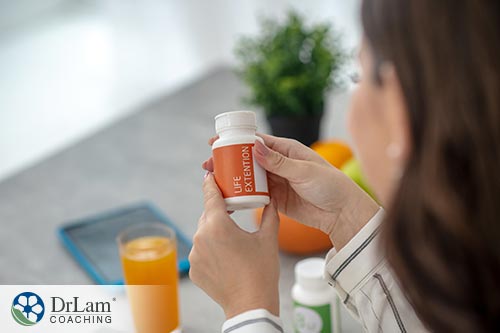 Many of us have experienced heart palpitations. These are the feelings that make you think your heart has skipped a beat, or that your heart is beating so fast it feels as if it may jump out your chest. Besides thinking something major may be wrong with your health, many of us also wonder whether we have a shortage of vitamins and minerals. So, taking vitamins for heart palpitations may be the answer.
Many of us have experienced heart palpitations. These are the feelings that make you think your heart has skipped a beat, or that your heart is beating so fast it feels as if it may jump out your chest. Besides thinking something major may be wrong with your health, many of us also wonder whether we have a shortage of vitamins and minerals. So, taking vitamins for heart palpitations may be the answer.
Well, the good news about heart palpitations is that they rarely result from a heart-related issue. In most cases, they result from blood sugar issues, stress or anxiety, exercise, caffeine, hormonal changes taking place in your body while you are pregnant, dehydration, and even alcohol consumption or nicotine withdrawal.
At times, your heart palpitations may be due to a lack of certain vitamins and minerals. Here, taking mineral supplements or vitamins for heart palpitations may rectify the situation.
If, however, your heart palpitations are accompanied by chest pains, dizziness, shortness of breath, nausea, or unusual sweating, you may want to consult a healthcare practitioner as soon as possible. These symptoms, together with heart palpitations, may point to an underlying heart condition.
Some people may claim they are genetically predisposed towards contracting a certain health issue. One of the genetically predisposed issues is heart palpitations. In most instances, though, your heart palpitations result from a certain trigger which may either be lifestyle or nutrition-based. Practitioners of conventional medicine may take a conventional approach to the issue. This includes medication, surgery, or even a medical implant. None of these, however, address the trigger mechanism that caused the palpitations in the first place.
Caffeine is a stimulant found in coffee and many drinks that could potentially give you heart palpitations. In addition to this, many people who get heart palpitations consume large quantities of sugar daily. Switching to a sugar-free sweetener does not work because it may also cause heart palpitations.
If you drink a lot of coffee and sugary drinks or make use of artificial sweeteners, your first course of action would be drastically limiting their intake.
Anxiety and stress are two common causes of heart palpitations. This is because of the effect these have on your body.
Your brain’s hypothalamus sees stress as a threat. As part of your Hypothalamic-Pituitary-Adrenal axis, your hypothalamus’ perception of a threat starts a series of chemical reactions throughout your body to prepare it to either "fight-or-flight". This results in the increased production of stress hormones so that your body can cope with the situation. Your breathing may become more shallow and rapid, your body’s muscles may become tensed and ready for action, and your heart rate may increase. The latter, of course, is in the form of heart palpitations. Your body’s response to threats is automatic and is referred to as the NeuroEndoMetabolic (NEM) stress response.
Certain medications that address heart rhythms may cause heart palpitations. Do make sure you know all possible side effects before starting on any course of treatment.
Multivitamin supplements combined with certain herbs may result in heart palpitations. Amongst the herbs you need to be wary of are valerian, hawthorn, ginseng, ephedra, and bitter orange.
Heart palpitations may result from certain nutritional deficiencies and imbalances. What follows are different mineral supplements and vitamins for heart palpitations that may be compromised in your system.
 A magnesium deficiency may cause heart palpitations. Blood tests for a magnesium deficiency may not accurately estimate a deficiency. In many cases, a magnesium supplement such as Mag Three is as effective in addressing heart palpitations as the use of certain conventional drugs. A magnesium deficiency may also cause a sudden heart attack in healthy athletes due to a depletion in their magnesium stores resulting from exercise.
A magnesium deficiency may cause heart palpitations. Blood tests for a magnesium deficiency may not accurately estimate a deficiency. In many cases, a magnesium supplement such as Mag Three is as effective in addressing heart palpitations as the use of certain conventional drugs. A magnesium deficiency may also cause a sudden heart attack in healthy athletes due to a depletion in their magnesium stores resulting from exercise.
Just like with magnesium, lab blood tests may not accurately show that you have a potassium deficiency inside your cells as the blood draw is from the serum. Strangely enough, a potassium supplement may not necessarily correct the problem. A magnesium supplement may help rectify a potassium deficiency.
Foods high in magnesium include leafy green vegetables like spinach and kale, figs, bananas, nuts and seeds, and legumes like beans, peas, and chickpeas. Potassium-rich foods include spinach, dried fruit like dates and raisins, legumes like pinto beans and soybeans, bananas, oranges, and apricots.
A deficiency in thiamine is not usually associated with heart palpitations. However, when looking at whether there is a thiamine deficiency in people with heart palpitations and other heart issues, an imbalance usually occurs.
Foods high in thiamine include lean beef, liver, nuts, oats, eggs, legumes, seeds, and oranges.
A folate deficiency could result in megaloblastic anemia. Heart palpitations are a common symptom of the condition. Besides a folate supplement, you could also consider including more leafy green vegetables, asparagus, eggs, beets, and citrus fruit in your diet. These foods are high in folate.
An iron deficiency could lead to anemia and heart palpitations. This deficiency is quite common in younger women who suffer from heavy bleeding during their periods. Other people at risk of an iron deficiency include vegans, young children, people with cancer, and those with gastrointestinal issues.
Iron-rich foods to consider adding to your diet include spinach, legumes, and lean meat. An iron supplement may also help, but beware of constipation.
The importance of vitamin C as one of the most important vitamins for heart palpitations cannot be underlined enough. Vitamin C is crucial for iron absorption. So, consider vitamin C as one of your go-to vitamins for heart palpitations as well as consuming enough foods containing this vitamin.
Foods high in vitamin C include broccoli, kale, kiwi fruit, oranges, papaya, green peppers, sweet potatoes, tomatoes, and strawberries.
Anemia and heart palpitations may result from a vitamin B12 deficiency. Besides considering this vitamin as one of your vitamins for heart palpitations, you could also try and ensure you get enough of the vitamin in your diet.
Good food sources of vitamin B12 include lean beef, organ meats like liver and kidney, shellfish, and fish sources such as tuna, trout, and sardines.
A few good options include:
 It is very unlikely that a good multivitamin by itself would cause heart palpitations. When choosing one, try to make sure that it has as many of the vitamins and minerals present that you could have a shortage of like this Adrenal Daily Nutrient.
It is very unlikely that a good multivitamin by itself would cause heart palpitations. When choosing one, try to make sure that it has as many of the vitamins and minerals present that you could have a shortage of like this Adrenal Daily Nutrient.
Omega-3 fatty acids are supplements derived from fish oil like Liquid OM-3. They support heart health by reducing the triglyceride levels in your blood and by addressing blood pressure issues. Salmon, tuna, and mackerel are good sources of Omega-3.
Besides allowing for regular bowel movements, fiber may also help to lower your ‘bad’ cholesterol levels. In doing so, fiber supports heart health by helping to avoid potential causes of atrial fibrillation and thus heart palpitations.
You could also consider taking a coenzyme Q10 (CoQ10) supplement like LipoNano CoQ. Your body makes this antioxidant as well and it is essential for proper cellular function. The long-term use of CoQ10 may ease the frequency of atrial fibrillation and thus heart palpitations. The enzyme also addresses high blood pressure issues. Although considered safe in most cases, people taking blood-thinning medications should be wary of CoQ10 as it could counteract their effectiveness.
However, there's a word of caution. When considering any form of supplement, please first talk to your healthcare practitioner. Certain supplements may interfere with medications you may use. They would be able to advise on their suitability. While the supplements listed above are generally considered as safe for individuals with healthy hearts, adrenal fatigue sufferers need to be very careful. The very nature of energy enhancers involves stimulating cellular function by increasing metabolism. This can be devastating for those with preexisting weaknesses and sensitivities, such as those with adrenal fatigue. The more advanced the stage, the greater the risk.
As mentioned, stress is probably one of the main causes of heart palpitations. The moment stress is perceived, your HPA axis goes into play and your NEM is activated, making your heart work harder. This is because your Cardionomic Circuit, in which your heart plays the main role, is geared to either work at helping your body to run, or to fight. This is largely due to an increase in stress hormones released via your adrenal glands.
At the same time, your body sees a decrease in those functions not considered essential for your immediate survival. This affects the production of various hormones as well as the function of various organ systems.
If stress carries on indefinitely, the impact on your body and its various functions, including that of the Cardionomic Circuit, are negatively affected. This leads to a series of symptoms that may seem unrelated but have the same root cause – stress. Heart palpitations may very well be one of the symptoms you experience.
Besides considering various vitamins for heart palpitations, you could also consider making lifestyle changes that reduce stress, doing stress-reduction exercises like meditation, and following an adrenal fatigue diet that offers adrenal support. Breathing with your abdomen and calming your mind could make the most impact on bringing your parasympathetic nervous system up to match the sympathetic overtone from the heart palpitations.
Vitamins for heart palpitations may help with the problem and even provide a measure of adrenal support.
If you are suffering from heart palpitations, here are some things you could do.

If you would like to know more about or need assistance with vitamins for heart palpitations, the team at Dr. Lam Coaching will help. We offer a free** no-obligation phone consultation at +1 (626) 571-1234 where we will privately discuss your symptoms and options with you. You can also send us a question through our Ask The Doctor system by clicking here.
To a large extent, yes. Vitamins for heart palpitations support adrenal function because heart palpitations are one of the many symptoms of adrenal fatigue. These vitamins address certain shortages in your body, thereby supporting both heart and adrenal health at the same time.
